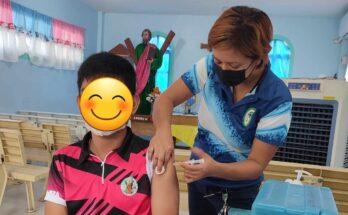The first case of a patient infected with new strain of coronavirus from China is admitted in a hospital in Cebu City.
Department of Health (DOH) confirmed that a 5-year-old child from Wuhan City in China is now in Cebu hospital after testing positive with novel coronavirus strain which is spreading across Asia.
In a press conference on Tuesday, Health secretary Francisco Duque III said that samples were taken from the patient and brought to Research Institute for Tropical Medicine (RITM) for testing. It tested negative of the previous known strains of coronavirus – MERS-COv (Middle East respiratory syndrome coronavirus) and SARS-COv (Severe acute respiratory syndrome coronavirus).
“However, the samples tested positive for the non-specific pancoronavirus assay, thus the specimen has been sent to Australia to identify the specific coronavirus strain,” said Duque.

DOH is also monitoring three individuals with flu-like symptoms upon entering the country via the Kalibo International Airport from China, but without any history of travel to Wuhan and without any known contact with a confirmed 2019 novel coronavirus (2019-nCoV) case, Severe Acute Respiratory Illness case, or sick animals. Throat samples from these patients were already sent to RITM for testing. All three cases are currently well and are no longer manifesting any symptoms.
[Related: 3 Chinese tested in Kalibo hospital for new coronavirus strain]
Coronaviruses are a large family of viruses ranging from the common cold to more serious infections such as MERS-CoV and SARS-CoV. Common signs of coronavirus infection include respiratory symptoms, fever, cough, shortness of breath and breathing difficulties. In severe cases, it can cause pneumonia, acute respiratory syndrome, kidney failure, and even death.
On December 31, 2019, a clustering of pneumonia cases of unknown etiology was reported in Wuhan, China. The outbreak was later determined to be caused by a 2019-nCoV, a new coronavirus strain that has not been previously identified in humans. To date, two hundred twenty-two (222) 2019-nCoV cases were reported in China, majority coming from Wuhan, with cases also coming from cities such as Beijing and Shenzhen. Thailand, Japan, and South Korea also reported confirmed cases. Initially, the said disease was thought to be transmitted through animal contact but recent reports show human-to-human transmission of 2019-nCoV.
The Bureau of Quarantine is working with airlines and airport authorities to strengthen border surveillance, while the Epidemiology Bureau is heightening its community surveillance. The Department is also enhancing its coronavirus laboratory testing capacity, hospital preparedness, rapid response, and its risk communication and information dissemination. Personal Protective Equipment are available at the Bureau of Quarantine, Centers for Health Development, and DOH Hospitals. DOH is also closely monitoring individuals who manifested signs of respiratory infection and had a history of travel to China and is coordinating with WHO and China Center for Disease Control for updates.
“I encourage the health workers to be vigilant and take extra precautionary measures when in contact with patients with acute respiratory infection, especially those with travel history to China,” Health Secretary Francisco T. Duque III said.
DOH advises the public to practice frequent handwashing, avoid unprotected contact with farm or wild animals, practice proper cough etiquette – maintain distance and cover coughs and sneezes with a tissue or the crook of your elbow, avoid close contact with people showing cold or flu-like symptoms, and ensure that food is well-cooked.
“I urge travelers with symptoms of respiratory illness, either during or after travel, to seek medical attention immediately. I also call on our health facilities to enhance standard infection prevention and control practices, especially in our emergency departments. We must always be ready,” the Health Chief concluded.



